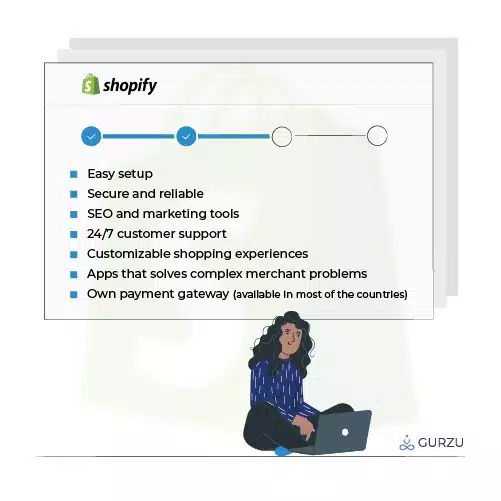Shopify is an all-in-one eCommerce company platform that enables digital sellers to start, run, and grow their businesses online. It was founded in 2006 in Ottawa, Canada. It’s a subscription-based program created specifically for eCommerce business owners.
Anyone may use Shopify to create an online store and sell their goods. Shopify is one of the most popular eCommerce systems on the planet, with a market share of 23% in the United States alone. 1.75 million businesses sold on Shopify in 2021, while 1.59 million active websites used the platform to support their eCommerce offerings. In 2021, the company’s total sales was $4,611.9 million, which is up by 57 percent from 2020.

What is Shopify?
Shopify is a cloud-based, multi-channel commerce platform designed for small and medium-sized businesses. Shopify offers online retailers a suite of services including marketing, customer engagement, payments, and shipping tools to simplify the process of running an online store for small merchants.
The Shopify platform was engineered for reliability and scale, making enterprise-level technology available to businesses of all sizes. Shopify currently powers over 800,000 businesses in approximately 175 countries. Shopify comes with a range of tools that helps to analyze every aspect of online commerce. The technology also helps in cost cutting by automating customer relationship management, inventory management, transactions and many more.
How does Shopify Work?
Shopify works using the Software as a Service(SaaS) model through a monthly subscription. It is a cloud-based system so merchants don’t have to worry about upgrading or maintaining software’s or web servers. Shopify store setup can be done in 15 minutes and it provides an online store builder which can customize the look and feel of the online store.
Merchants can create their own store, customize, sell in multiple locations, manage product, inventory, payments and shipping. Shopify Payments helps the hassle free setup of third-party payment gateways as Shopify accepts all major payment methods.
Why Shopify ?

- Easy setup
An online store can be quickly launched without any tech worries. All software and hosting is provided by Shopify which is much faster and secure. The merchants have to just get their products ready to sell.
- Secure and reliable
The data can be encrypted and passed through secured connections. Also shopify makes sure of all the maintenance and upgrades related to the store and shopping cart.
- SEO and marketing tools
The shopify store gives a huge range of marketing tools including social media integration, product reviews and email marketing. It supports advanced analytics to tailor the marketing.
- Apps that solves complex merchant problems
Different types of free or paid apps are available that help on the customer whislists, analytics, data exporting and so on. Merchants can easily install the app to the shop as per their requirements.
- Customizable shopping experiences
Availability of different free and paid themes that can be fully customized as per the store branding.
- Own payment gateway (available in most of the countries)
Shopify has its own payment gateway powered by Stripe that doesn’t require any transaction fee. Other different payment gateways can also be integrated.
- 24/7 customer support
Shopify provides continuous support with quick responses. Along with that there are a number of community forums, extensive documentation and a wide range of advanced Shopify University guides
Shopify Categories
- Clothing & apparel is the most popular category on Shopify, with 75.5 thousand merchants selling it.
- T-shirts and tops, in particular, are the most popular items across the Shopify marketplace.
- Clothing and apparel make up 27.5 percent of Shopify stores in the UK, making it the most popular category there. Home and garden products are sold in 14.9 percent of UK Shopify stores, and beauty and fitness products are sold in 11.5 percent.
- Home and garden is Shopify’s second-largest category, with 33.8 thousand stores on the site.
- Automotive parts are sold in 6.2 thousand Shopify stores.
- Retail (17%), clothes & fashion (11%), and computer software are the three most popular industries on Shopify Plus (6 percent ). Together, they account for 34% of Shopify Plus sales. Wholesale, consumer products, health, wellness & fitness, IT services, Internet services, marketing & advertising services, and cosmetics are among the other Shopify Plus categories (in order of popularity).
- Budweiser, Tesla, and Red Bull are among the most successful Shopify users.
When choosing your ecommerce software, consider your current and future needs. Some platforms may be the best solution for today, but a powerful platform like Shopify can get you started quickly and support your future growth.
What is eCommerce Outsourcing?
DesignRush defines eCommerce outsourcing as the process of hiring a third-party to handle tasks like managing inventory, running websites, or providing sales support.
Need help planning your eCommerce platform? Book a free consulting session with us!

